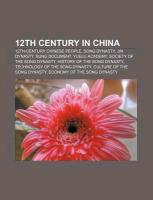- Start
- 12th century in China
12th century in China
Angebote / Angebote:
Source: Wikipedia. Pages: 128. Chapters: 12th-century Chinese people, Song Dynasty, Jin Dynasty, Sung Document, Yuelu Academy, Society of the Song Dynasty, History of the Song Dynasty, Technology of the Song Dynasty, Culture of the Song Dynasty, Economy of the Song Dynasty, Architecture of the Song Dynasty, Jingkang Incident, Along the River During the Qingming Festival, History of Song, Bayan of the Baarin, Gong Kai, Longhua Temple, Four Books and Five Classics, Sixteen Prefectures, Baojia system, Guai Zi Ma, Yingzao Fashi, Zizhi Tongjian, Iron Pagoda, Battle of Caishi, Shanyuan Treaty, Cannon in the Song Dynasty, Dazu Rock Carvings, Lugou Bridge, Quanzhou ship, Liaodi Pagoda, Battle of Tangdao, Sung Wong Toi, Lingyan Temple, Islam during the Song Dynasty, Liuhe Pagoda, Anping Bridge, Song poetry, Magic circle, Pizhi Pagoda, Liang Hongyu, Mathematical Treatise in Nine Sections, Xin fa, Qingli Reforms, New Book of Tang, Lingxiao Pagoda, Guangyun, Piya, Zhangpu County, Beisi Pagoda, Battle of B¿ch пng, Prime Tortoise of the Record Bureau, Song Huiyao Jigao, Extensive Records of the Taiping Era, Yunjing, Treatise on Tea, The Record of Tea, Imperial Readings of the Taiping Era, Four Great Books of Song, Qiyin lüe, The Accounts of Jingkang, Alliance on the Sea, Treaty of Shaoxing, Finest Blossoms in the Garden of Literature, Jiyun, Culai Academy, New History of the Five Dynasties, Huizi, Song official headwear. Excerpt: Chinese society during the Song Dynasty (AD 960-1279) was marked by political and legal reforms, a philosophical revival of Confucianism, and the development of cities beyond administrative purposes into centers of trade, industry, and maritime commerce. The inhabitants of rural areas were mostly farmers, although some were also hunters, fishers, or government employees working in mines or the salt marshes. Conversely, shopkeepers, artisans, city guards, entertainers, laborers, and wealthy merchants lived in the county and provincial centers along with the Chinese gentry-a small, elite community of educated scholars and scholar-officials. As landholders and drafted government officials, the gentry considered themselves the leading members of society, gaining their cooperation and employment was essential for the county or provincial bureaucrat overburdened with official duties. In many ways, scholar-officials of the Song period differed from the more aristocratic scholar-officials of the Tang Dynasty (618-907). Civil service examinations became the primary means of appointment to an official post as competitors vying for official degrees dramatically increased. Frequent disagreements amongst ministers of state on ideological and policy issues led to political strife and the rise of political factions. This undermined the marriage strategies of the professional elite, which broke apart as a social group and gave way to a multitude of families which provided sons for civil service. Confucian or Legalist scholars in ancient China-perhaps as far back as the late Zhou Dynasty (c. 1046-256 BC)-categorized all socio-economic groups into four broad and hierarchical occupations (in descending order): the shi (scholars, or gentry), the nong (peasant farmers), the gong (artisans and craftsmen), and the shang (merchants). Wealthy landholders and officials possessed the resources to better prepare their sons for the civil service examinations, yet they were often rivaled in thei
Folgt in ca. 5 Arbeitstagen
